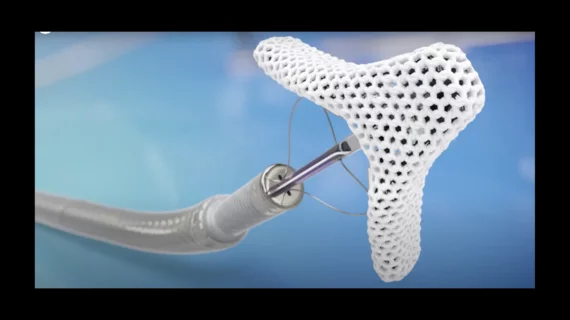FDA advisory panel votes in favor of Abbott’s TriClip device for tricuspid regurgitation
A U.S. Food and Drug Administration (FDA) advisory panel has officially voted in favor of Abbott’s TriClip G4 transcatheter edge-to-edge repair (TEER) system for severe tricuspid regurgitation (TR). The agency’s Circulatory System Devices Panel met Tuesday, Feb. 13, to discuss the device’s safety and effectiveness as a treatment option for TR. After hours of discussion, the group voted that, yes, TriClip’s benefits outweigh any potential risks by a final count of 13 to 1.
Abbott issued an immediate statement once the FDA panel’s decision was final.
“TR can put added strain on the heart and lead to other cardiovascular issues, which can significantly worsen a person's quality of life, but historically there have been few treatment options,” said Lars Søndergaard, MD, chief medical officer and divisional vice president of medical affairs with Abbott's structural heart business. “Abbott recognized the unmet need for people with this condition and explored the use of our proven clip-based technology to find a truly life-changing intervention. TriClip offers an urgently needed alternative that is safe and effective for people who require tricuspid valve repair but are not able to withstand surgery.”
Though approved in many parts of the world, TriClip remains an investigational device in the United States. However, this panel’s decision suggests a full FDA approval could be on the horizon.
If Abbott’s TEER system does gain FDA approval, it would represent a second treatment option for patients presenting with TR. Edwards made history just days ago when the FDA approved its Evoque transcatheter tricuspid valve replacement (TTVR) device for TR.
FDA panel reviews TRILUMINATE data to reach its TriClip decision
The advisory panel’s decision was based primarily on data from the TRILUMINATE trial, which included 350 patients randomized to either undergo TEER with TriClip or guideline-directed medical therapy.
Overall, the TRILUMINATE study’s primary endpoint—a hierarchical composite that included all-cause mortality, tricuspid valve surgery, heart failure hospitalization and quality of life (QOL) improvements after one year—favored treatment with TEER. However, there were no significant differences when it came to all-cause mortality/tricuspid valve surgery or heart failure hospitalizations. The primary difference was related to QOL improvements as measured by the Kansas City Cardiomyopathy Questionnaire (KCCQ).
In terms of safety, TriClip was more of a runaway success, with more than 98% of patients free from major adverse events after 30 days.
Click here to read the full results in the New England Journal of Medicine.
The advisory panel’s final votes
The FDA’s lengthy discussion concluded with a vote. First, the panel agreed by a vote of 14 to 0 that the TriClip device was safe for patients presenting with severe TR. Next, the panel voted by a count of 12 to 2 that the device was an effective treatment for patients presenting with TR.
Finally, the panel voted by a count of 13 to 1 that its benefits outweighed any potential risks.
James C. Blankenship, MD, a practicing interventional cardiologist and the director of cardiac catheterization laboratories with the University of New Mexico, voted “yes” to all three questions. He said during the final discussion that he compared safety data from TRILUMINATE with initial data on the Evoque TTVR device and found that they were “in the same ballpark.” In terms of efficacy, meanwhile, he said the statistical improvement in QOL helped guide his decision
“Since the safety seems proven and the efficacy is definitely positive, the benefit-risk ratio favors approving it,” Blankenship said.
Ralph Brindis, MD, MPH, a professor with the University of California San Francisco, also voted “yes” to all three questions.
“If the FDA approves this device, I think it will be an important armamentarium for the management of TR,” Brindis said. If the Abbott device does gain approval, he added, he is curious how clinicians will choose between treatment with the Evoque TTVR device and treatment with TriClip.
The full panel discussion is available here.
The panel’s decision does not represent a full FDA approval
This positive vote does not mean the TriClip G4 TEER device has been approved by the FDA. While the advisory panel’s recommendations typically line up with the agency’s final decisions, that is not always the case.
For now, the TriClip device remains investigational only in the United States.

